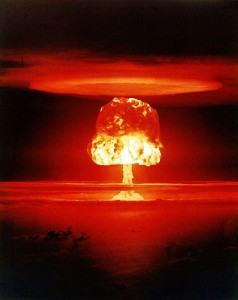With tensions rising in the Middle East over the possibility of Iran pursuing a nuclear option and the fading memory of the Cold War, it would do us all well to recall how and why the only two nuclear bombs were deployed. The atomic bombs dropped on Hiroshima and Nagasaki caused an accumulated death toll of at least 200,000, with half of those during the first 24 hours. Until now, at least, such weapons have never been used again.
In his 1955 memoirs, Harry Truman dedicated just three pages to what is still remembered as the most devastating two days of warfare in human history. He wrote:
I regard the bomb as a military weapon and never had a doubt that it should be used. The top military advisers to the President recommended its use, and when I talked to Churchill he unhesitatingly told me that he favored the use of the atom bomb if it might aid the end of the war.
President Truman never wavered in his belief that his decision was the correct one. The devastating effects of the two bombs convinced the Japanese that unconditional surrender was their only option and spared tens of thousands of American soldiers from death had a frontal assault been attempted on Japan proper. General Marshall had gone so far as to estimate an invasion of the islands of Japan could cost up to half a million American lives.
 On July 26, 1945, Truman issued an ultimatum to the Japanese it what came to be known as the Potsdam Proclamation. There was no mention of a nuclear weapon, but the decree warned Japan to either surrender or face “prompt and utter destruction.” Two days later, the Japanese premiere responded that the ultimatum was “unworthy of public notice.” From there it was inevitable that the weapons would be used.
On July 26, 1945, Truman issued an ultimatum to the Japanese it what came to be known as the Potsdam Proclamation. There was no mention of a nuclear weapon, but the decree warned Japan to either surrender or face “prompt and utter destruction.” Two days later, the Japanese premiere responded that the ultimatum was “unworthy of public notice.” From there it was inevitable that the weapons would be used.
After the war, there were a number who questioned Truman’s decisions. Generally, they were necessarily left-leaning pacifists. Dwight D. Eisenhower revealed that he had expressed concerns before the bomb was employed, telling then-President Truman of his “belief that Japan was already defeated and that dropping the bomb was completely unnecessary.”
Many revisionists contend the dropping of the bomb had far more to do with sending a warning to Russia than ending the war with Japan. The coalition of Truman, Churchill, and Stalin was strictly one of necessity. But with the bomb, there was no need to include Russia in the Pacific conflict. With the fall of Germany, Truman was rightly convinced that Russia was no longer an ally. Communist Russia, he believed, was sure to be a post-war adversary. In regard to that, he was more than correct.
Even if leaving Russia out of ending the war with Japan was a motivation, there is still no doubt the cost Americans faced in bringing an end to Japan’s unreasonable holding out to the end. The campaign in Okinawa left almost 13,000 Americans dead and soldier’s minds reeling with memories of Japanese kamikaze tactics. It was warfare as never seen before, and many feared more of the same for at least another year if a conventional assault on Japan was mounted.
There was also a bit of political reality that played in the background. Emperor Hirohito was more than the leader of Japan. He was its religious icon as well. Truman wanted a way to bring about the surrender of the Japanese army without having to assault the Emperor himself. He was almost bound by public opinion at home to settle for nothing less than unconditional surrender. By dropping the bombs, Truman accomplished ending the war while allowing the Emperor to remain on as titular head of Japan, a position he held until his death in 1989.
While revisionists raise certain questions, the truth is there was one reason for the use of the bomb. America needed to end the war. Though it had been tested successfully, there was no way to be sure the bomb would even work in an airdrop. Had the Potsdam Proclamation been made and then followed by a failure of the bomb, the results would have been devastating to an American military and civilian population worn down by five years of conflict that cost almost half a million American lives.
Much has been learned about the long term effects of radiation that were not fully understood in 1945. The nuclear option is really no option at all in a world where a number of players hold the same cards. Because of that, the major players on the world stage have all but put that card away. What we need now fear are the wildcards like Iran that are not trying to end a war but rather start one.
___________________________________________________________________________
 ___________________________________________________________________________
___________________________________________________________________________
 Off The Grid News Better Ideas For Off The Grid Living
Off The Grid News Better Ideas For Off The Grid Living
